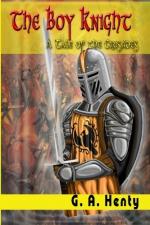Upon the following day the army again marched, and Cuthbert could not but notice the difference, not only in number but in demeanor, from the splendid array which had left Acre a few months before. There was little now of the glory of pennon and banner; the bright helms and cuirasses were rusted and dinted, and none seemed to care aught for bravery of show. The knights and men-at-arms were sunburnt and thin, and seemed but half the weight that they had been when they landed. Fatigue, hardship, and the heat had done their work; disease had swept off vast numbers. But the remains of the army were so formidable in their fighting powers that the Saracens, although following them at a distance in vast numbers, did not venture an attack upon them.
A few days after their arrival at Acre, the king gave orders for the embarkation of the troops. Just as they were preparing to enter the ships a small vessel was seen entering the harbor. It drew up to the shore, and a knight leaped from it, and, inquiring where King Richard was to be found, made his way to the king, who was standing superintending the embarkation of some of the horses.
“The Saracens, sire!” he exclaimed. “The Saracens are besieging Jaffa, and the place must be lost unless assistance arrives in a day or two.”
The king leaped on board the nearest ship, shouted to his leading officers to follow him, and gave orders to others to bring down the troops with all possible speed, to waste not a moment, and to see that all was done, and then, in five minutes after the receipt of the news he started for Jaffa. The Earl of Evesham and Cuthbert had been standing near the king when the order was given, and followed him at once on board the bark which he had chosen.
“Ah, my gallant young knight,” the king exclaimed, “I am right glad to see you with me. We shall have more fighting before we have done, and I know that that suits your mood as well as my own.”
The king’s vessel was far in advance of any of the others, when early the following morning it arrived at Jaffa.
“Your eyes are better than mine,” the king said to Cuthbert. “Tell me what is that flag flying on the top of the town.”
Cuthbert looked at it earnestly.
“I fear, sire, that it is the crescent. We have arrived too late.”
“By the holy cross,” said King Richard, “that shall not be so; for if the place be taken, we will retake it.”
As the vessel neared the shore a monk ran out into the water up to his shoulders, and said to the king that the citadel still held out, and that even now the Saracens might be driven back. Without delay the king leaped into the water, followed by the knights and men-at-arms, and entering the gate, threw himself upon the infidels within, who, busy plundering, had not noticed the arrival of the ship.
The war cry of “St. George! St. George!” which the king always shouted in battle, struck panic among the infidels; and although the king was followed but by five knights and a few men-at-arms, the Saracens, to the number of three thousand, fled before him, and all who tarried were smitten down. The king followed them out upon the plain, driving them before him as a lion would drive a flock of sheep, and then returned triumphant into the city.




